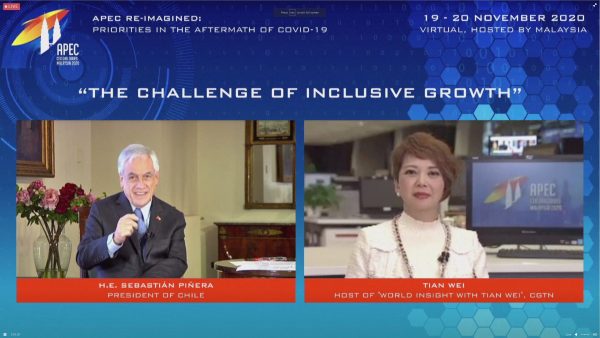There was general consensus on the need to undertake institutional reforms of the WTO at a time when trade liberalisation initiatives appear increasingly dominated by bilateral or regional free trade agreements. Even with ongoing negotiations on e-commerce, the WTO is struggling to produce new rules to address developments in the digital economy.
The Asia Pacific region has been a major beneficiary of the multilateral trading system, with APEC as the main forum for promoting trade and investment liberalisation, business facilitation and regional economic integration. Trade in goods and commercial services involving APEC economies almost quintupled between 1994–2019, averaging 6.7 per cent annually. In 2019, APEC economies collectively accounted for almost half of global trade while intra-APEC merchandise trade stood at 67.4 per cent. For most of those 25 years, trade growth outpaced GDP growth, reflecting the significance of trade as an economic driver for the region.
That all changed with the outbreak of COVID-19 which devastated the global economy. To curb the spread, APEC economies imposed lockdowns and travel restrictions. These containment measures led to a near standstill in economic activity as consumer demand plunged and business investments were suspended. Global supply chains were severely disrupted due to production stoppages and logistics bottlenecks.
According to the latest APEC Regional Trends Analysis report, the region will contract by 2.5 per cent in 2020, equivalent to US$1.8 trillion of output losses. Millions have lost jobs and fallen into poverty. COVID-19 has exacerbated many existing challenges faced by the region, including environmental degradation and social and economic inequality. Emerging from this crisis necessitates the redoubling of efforts in these and other areas.
Aside from strengthening the readiness and responsiveness of the healthcare sector to combat the pandemic, economies have to acknowledge that unsustainable practices — leading to habitat loss for wildlife, driving them to more frequent contact with humans and increasing public health risks — are partly responsible for the predicament the world is in today. The increased volume of COVID-19 medical waste, particularly from single-use plastics, and their improper management, could intensify environmental degradation.
Economies need to consider alternative modes of production. The circular economy is a model that minimises waste and optimises resource use that could be widely adopted to address these environmental challenges. The APEC Steering Committee on Economic and Technical Cooperation held a policy dialogue on the circular economy in line with its priorities of safeguarding the quality of life through sustainable growth and harnessing technologies for the future.
While the trend toward digitalisation predates the pandemic, digital applications have accelerated as communities, businesses and workers grapple with crisis. Digital solutions have become a necessity rather than an option. Digital payments have facilitated access to much-needed liquidity by businesses. Households are dependent on multiple digital platforms to maintain communication and purchase day-to-day needs. Governments are utilising innovative digital technology for viral contact tracing.
Digitalisation poses a new set of challenges — data privacy, cybersecurity, online misinformation and competition-related issues — that have become increasingly prevalent as more people move onto the digital world. A digital divide persists between and within economies, limiting the potential benefits of digitalisation. Economies have to undertake critical structural reforms to maximise the opportunities of the digital economy and overcome the challenges. On data privacy, regulators need to find the right balance between facilitating the growth of data-utilising businesses while ensuring that personal data remains protected.
Enhancing inclusion is another critical aspect that economies need to pay attention to. Despite decades of economic growth, improving living standards by enlarging the economic pie, the distribution of this pie is far from equitable, with negative ramifications for access to health, education and economic opportunities. The pandemic has exposed these inequalities as the poorest and most vulnerable, including women, youth and precarious workers, have been hit hardest. Economies have to ensure that social policies prevent vulnerable groups from slipping through the cracks, as increasing inequality is among the main contributors to growing anti-globalisation sentiment worldwide.
There should be a serious rethinking of existing policies to build a more resilient and inclusive Asia Pacific. APEC is well-placed to do so.
The new APEC Putrajaya Vision 2040 identifies ‘innovation and digitalisation’ as well as ‘strong, balanced, secure, sustainable and inclusive growth’ as among the key drivers to achieving the vision of an open, dynamic, resilient and peaceful Asia Pacific community. New Zealand as the incoming APEC host unveiled that it would organise its agenda around three priorities: economic and trade policies that strengthen recovery; increasing inclusion and sustainability for recovery; and pursuing innovation and a digitally enabled recovery.
Denis Hew is Director of the APEC Policy Support Unit.
Andre Wirjo is an analyst at the APEC Policy Support Unit.
This article is part of an EAF special feature series on the novel coronavirus crisis and its impact.
All views expressed in this article are the authors’ own and do not necessary reflect those of any institution or organisation.

